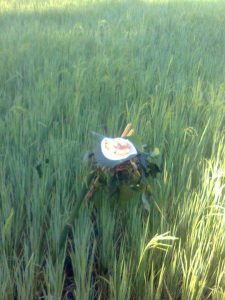Kani Poojuvo

 Kani Poojuvo
Kani Poojuvo
Kani Poojuvo is the custom followed next day (before sunrise) after the theerthodbhava.
The next day morning i.e. On 18th of October, all families would worship Mother Kavery. Some will keep Cucumber or Coconut wrapped in a red silk cloth or vastra on a bronze plate and decorate with Ornaments like Pathak, jomale and flowers in the Nellakki Nadubaade. In this hall, lamp called Thooke Bolcha is lighted and on another Tripod (i.e. Mukkali) Kavery holy water is kept and worshiped. Afterwards the holy water is sprinkled all over the rooms and all the members in the family throw rice grains on the goddess. The younger members in the field bow and touch the feet’s of elders and take their blessings.
Details about the ritual
Ancient days, the ladies in the house used to wake up early in the morning, take bath and then prepare dosa – kumbala kari. The prepared items along with jaggary, coconut and Banana leaf lamina were taken to the place where Bothu is planted. These items are placed on top of the Bothe and “Koyeee koyeee koyeee” is uttered loudly. Labourers, yerava or poliya will be waiting to consume this food; once they go back they will take this and eat.
After finishing this ritual of placing bothh putt, all the family members in the house will take bath, get ready and assemble in the Nellakki Nadubaade in front of decorated Kaveramme. Elder person from the gathering will take rice grains and distribute among them and will speak few words – “swamy Kaveramme nangada Ponne, Makkake, Yetha Kadchiyakku, Bith Bolekuu, aala baalakuu, oru thararthra kashta nashta aakathanake ninga Minjyake nindith Kaapaadyand pondundh bodiyavi”. After saying these words, rice grains will be sprinkled on Kaveramme and blessings will be taken; Theertha which was kept there will be consumed. After this ritual is completed, the woman touches her husband’s feet and asks for his blessings; also takes blessings from other elderly people. This is called as “Kani Poojuvo”.
On this day, Kumbala Kari and Dosa is prepared in each and every Kodava person’s house and only vegetarian cuisine is consumed.


Comments
Leave a comment!Login for Post Comment
Last posts